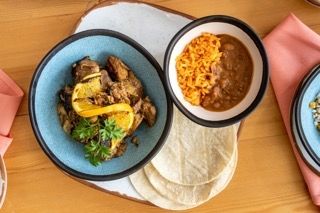Celebrate culture with happy hour and bold Mexican cocktails
Is Mexican Food Healthy? Unloading the Nutritional Benefits of Conventional Ingredients
The concern of whether Mexican food is healthy and balanced invites an exploration of its typical ingredients. Beans and corn work as fundamental staples, rich in healthy protein and fiber. Avocados provide useful fats, while numerous herbs and flavors include flavor and health benefits - take out and delivery. Together, these components develop a tapestry of nourishment. The healthiness of Mexican food often depends on prep work approaches and portion sizes. What role do these aspects play in determining its total dietary value?
The Power of Beans: Healthy Protein and Fiber-Rich Staples
Although often forgotten, beans work as a foundation of Mexican cuisine, offering a wide range of dietary advantages. Rich in healthy protein, they are a superb plant-based choice for those looking for to satisfy their dietary protein needs. This high healthy protein web content sustains muscle mass repair and development, making beans vital for both vegetarians and meat-eaters alike. In addition, beans are an exceptional resource of dietary fiber, which assists in food digestion and promotes a sensation of volume, potentially assisting with weight administration.
The range of beans used in Mexican recipes, such as black beans, pinto beans, and kidney beans, adds to a diverse taste account and can enhance dishes nutritionally. Beans are low in fat and consist of vital vitamins and minerals, including folate, magnesium, and iron. With each other, these characteristics make beans an essential active ingredient, delivering both sustenance and nourishment in typical Mexican price.
Corn: a Versatile Grain With Nutritional Benefits
Corn stands apart as a versatile grain fundamental to Mexican cuisine, celebrated not only for its culinary applications but also for its outstanding nutritional account. As a primary ingredient in meals like tortillas, tamales, and pozole, corn offers crucial nutrients that contribute to a well balanced diet regimen. Rich in carbohydrates, it serves as a substantial power resource, while additionally being low in fat, making it a beneficial choice for numerous dietary needs.
Corn is an excellent resource of dietary fiber, which aids in digestion and advertises satiation. It consists of considerable amounts of vitamins such as B-complex vitamins, which are essential for power metabolic rate. The visibility of anti-oxidants, especially carotenoids, contributes to overall wellness by minimizing oxidative tension. Additionally, corn is gluten-free, providing to those with gluten level of sensitivities. Generally, the nutritional advantages of corn highlight its importance in typical Mexican food and its function in a healthy diet regimen.
Avocados: Healthy And Balanced Fats and Nutrients in Every Bite
Avocados play a significant function in Mexican food, matching dishes with their luscious texture and abundant flavor. Beyond their culinary charm, avocados are celebrated for their excellent nutritional account. They are a rich resource of healthy and balanced monounsaturated fats, which can assist lower negative cholesterol levels and assistance heart health and wellness. Additionally, avocados are loaded with important vitamins and minerals, consisting of potassium, vitamin E, and B vitamins, adding to overall health.
The high fiber content in avocados help food digestion and promotes satiation, making them a helpful enhancement to any meal. Their unique nutrient structure can additionally support skin wellness and provide anti-inflammatory benefits. Including avocados right into traditional Mexican meals or appreciating them as a standalone treat can boost both flavor and nutrition, showing why they are a cherished staple in Mexican food. On the whole, avocados provide a tasty means to enjoy healthy fats and vital nutrients in every bite.

Herbs and spices: Flavorful Health Boosters
While enjoying the rich flavors of Mexican cuisine, one can not forget the crucial role that spices and herbs play in enhancing both preference and health and wellness. Active ingredients such as chili, cilantro, and oregano peppers not just add to the vivid taste profile but also give substantial wellness advantages. Cilantro is recognized for its cleansing homes, aiding to get rid of heavy steels from the body, while oregano is packed with anti-oxidants and has anti-inflammatory results.
Chili peppers, a staple in lots of Mexican dishes, have capsaicin, which has been connected to enhanced metabolism and discomfort relief. Furthermore, seasonings like cumin and coriander support food digestion and may assist in blood glucose regulation. Including these tasty wellness boosters into dishes not just enhances the cooking experience but additionally promotes general well-being, making Mexican cuisine not simply scrumptious, however additionally nutritionally helpful.
Typical Cooking Approaches: Enhancing Nutrition and Taste
Typical cooking approaches in Mexican cuisine play a crucial role in improving both nourishment and flavor, as they usually prioritize classic strategies and fresh ingredients. Methods such as nixtamalization, where corn is saturated and prepared in an alkaline service, not only improve the nutrient account of tortillas however likewise boost their digestibility - take out best mexican westchester NY and delivery. Additionally, the use of sluggish food preparation approaches, like stewing or braising, permits tastes to fuse magnificently while maintaining the honesty of the ingredients

Regularly Asked Questions
Are Mexican Food Portions Normally Larger Than Various Other Foods?
Mexican food portions are commonly larger than those of several various other foods. This particular shows standard eating methods, stressing common sharing and hearty meals, which can bring about an extra significant serving size overall.
Exactly how Does the Prep Work Technique Affect Healthfulness of Mexican Food?
Preparation methods considerably affect the healthfulness of Mexican food. Strategies such as grilling or steaming preserve nutrients, while frying can enhance undesirable fat web content. Options of components and cooking styles eventually identify total nutritional value.
Can Mexican Food Be Tailored for Certain Nutritional Limitations?
Mexican food can without a doubt be customized for certain dietary limitations. Substitutions, such as utilizing corn tortillas for gluten-free diet plans or integrating more vegetables, enable people to enjoy conventional flavors while accommodating numerous dietary demands.
What Prevail Misconceptions About Mexican Food and Wellness?
Usual false impressions concerning Mexican food consist of the belief that it is naturally harmful, extremely hot, and exclusively concentrated on fats. In truth, conventional dishes usually include nutritious ingredients and can be tailored to numerous dietary demands.
Are There Much Healthier Alternatives at Mexican Dining Establishments?
Much healthier choices at Mexican restaurants often include smoked meats, beans, and fresh vegetables. Picking meals that emphasize entire components and staying clear of heavy sauces can lead to a more nutritious eating experience, promoting total wellness.
The variety of beans utilized in Mexican recipes, such as black beans, pinto beans, and kidney beans, contributes to a varied flavor account and can improve dishes nutritionally. Avocados play a considerable role in Mexican cuisine, enhancing meals with their creamy appearance and rich taste. Incorporating avocados right into conventional Mexican recipes or enjoying them as a standalone treat can improve both flavor and nourishment, demonstrating why they are a cherished staple in Mexican cuisine. While appreciating the rich tastes of Mexican cuisine, one can not neglect the vital role that spices and natural herbs play in enhancing both taste and wellness. Conventional food preparation methods in Mexican food play an essential function in boosting both nourishment and taste, as they typically focus on time-honored methods and fresh active ingredients.